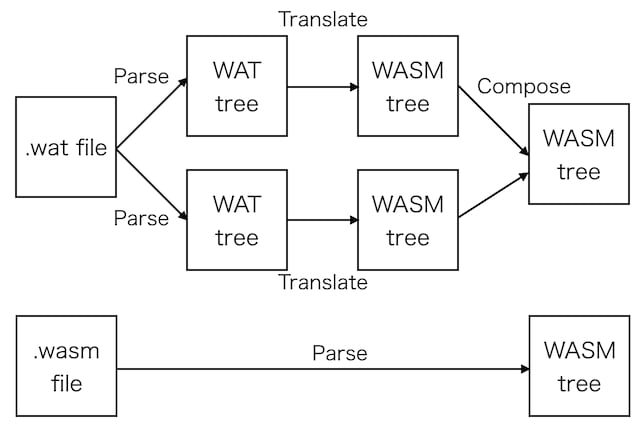9 releases
| 0.1.7 | Nov 18, 2023 |
|---|---|
| 0.1.6 | Jun 11, 2020 |
| 0.1.5 | May 24, 2020 |
| 0.1.4 | Apr 5, 2020 |
| 0.0.0 | Feb 23, 2020 |
#29 in WebAssembly
29 downloads per month
315KB
6.5K
SLoC
wain
wain is a WebAssembly INterpreter written in Safe Rust from scratch with zero dependencies. An implementation of WebAssembly.

Features:
- No unsafe code. Memory safety and no undefined behavior are guaranteed
- No external runtime dependency. It means no unsafe dependency and less binary size
- Efficiency. Avoid unnecessary allocations and run instructions as fast as possible without unsafe code
- Modular implementation. Binary format parser, text format parser, validator, executor are developed as separate libraries
Note that this project is in progress. Before v1.0.0 means experimental. Not all of the features are implemented yet. Current status is that all the MVP implementations have been done and many tasks are remaining.
Roadmap to v1.0.0 (priority order):
- Add sufficient tests to all libraries and fuzz tests for parsers
- Pass all spec tests
- Add benchmarks to track performance
- Introduce an intermediate representation to execute instructions more efficiently
- Add documentation for every public APIs
Please see the task board for current progress.
This project started for fun and understanding Wasm deeply.
Installation
wain crate is not published yet. Please clone this repository and build the project by cargo build.
Minimum supported Rust version is 1.45.0.
$ cargo install wain
$ wain --help
If you don't want to run text format code, it can be omitted:
# Only run binary format files
$ cargo install wain --no-default-features --features binary
Usage
wain command
Run a binary format Wasm source file:
$ wain examples/hello/hello.wasm
Hello, world
Run a text format Wasm source file:
$ wain examples/hello/hello.wat
Hello, world
Without argument, wain command detects both binary format and text format from stdin and runs the
input.
$ wain < examples/hello/hello.wasm
Hello, world
$ wain < examples/hello/hello.wat
Hello, world
Please see examples directory for more examples.
Current restrictions are as follows:
- Only
int putchar(int)andint getchar()are implemented as external functions by default - wain can run only one module at once. It means that importing things from other modules does not work yet
- Many extensions like threads, WASI support, SIMD support, ... are not implemented yet
As libraries
wain consists of multiple crates.
- wain: Command line tool to execute given Wasm sources
- wain-ast: Abstract syntax tree definition. Implementation of Wasm structure spec. This syntax tree is common for both binary format and text format
- wain-syntax-binary: Parser for Wasm binary format (
.wasmfiles). Implementation for Wasm binary format spec. It parses&[u8]value intowain_ast::Rootabstract syntax tree - wain-syntax-text: Parser for Wasm text format (
.watfiles). Implementation for Wasm text format spec. It parses&strvalue intowain_ast::Rootabstract syntax tree - wain-validate: Validator of a Wasm abstract syntax tree. Implementation of Wasm validation spec
- wain-exec: Executor which interprets a Wasm abstract syntax tree. Implementation of Wasm execution spec. It directly interprets a syntax tree for now, but in the it would translate the tree into an intermediate representation to execute it efficiently
wain-* crates are libraries as modular implementation of WebAssembly. They can parse, validate,
execute WebAssembly code.
Here is an example code to run the interpreter from Rust.
extern crate wain_syntax_binary;
extern crate wain_validate;
extern crate wain_exec;
use std::fs;
use std::process::exit;
use wain_syntax_binary::parse;
use wain_validate::validate;
use wain_exec::execute;
// Read wasm binary
let source = fs::read("foo.wasm").unwrap();
// Parse binary into syntax tree
let tree = match parse(&source) {
Ok(tree) => tree,
Err(err) => {
eprintln!("Could not parse: {}", err);
exit(1);
}
};
// Validate module
if let Err(err) = validate(&tree) {
eprintln!("This .wasm file is invalid!: {}", err);
exit(1);
}
// Execute module
if let Err(trap) = execute(&tree.module) {
eprintln!("Execution was trapped: {}", trap);
exit(1);
}
Or invoke specific exported function with arguments
// ...(snip)
use wain_exec::{Runtime, DefaultImporter, Value};
use std::io;
// Create default importer to call external function supported by default
let stdin = io::stdin();
let stdout = io::stdout();
let importer = DefaultImporter::with_stdio(stdin.lock(), stdout.lock());
// Make abstract machine runtime. It instantiates a module
let mut runtime = match Runtime::instantiate(&tree.module, importer) {
Ok(m) => m,
Err(err) => {
eprintln!("could not instantiate module: {}", err);
exit(1);
}
};
// Let's say `int add(int, int)` is exported
match runtime.invoke("add", &[Value::I32(10), Value::I32(32)]) {
Ok(ret) => {
// `ret` is type of `Option<Value>` where it contains `Some` value when the invoked
// function returned a value. Otherwise it's `None` value.
if let Some(Value::I32(i)) = ret {
println!("10 + 32 = {}", i);
} else {
unreachable!();
}
}
Err(trap) => eprintln!("Execution was trapped: {}", trap),
}
By default, only following C functions are supported in env module as external functions
int putchar(int)(in wasm(func (param i32) (result i32)))int getchar(void)(in wasm(func (param) (result i32)))void *memcpy(void *, void *, size_t)(in wasm(func (param i32 i32 i32) (result i32)))void abort(void)(in wasm(func (param) (result)))
But you can implement your own struct which implements wain_exec::Importer for defining external
functions from Rust side.
extern crate wain_exec;
extern crate wain_ast;
use wain_exec::{Runtime, Stack, Memory, Importer, ImportInvokeError, ImportInvalidError}
use wain_ast::ValType;
struct YourOwnImporter {
// ...
}
impl Importer for YourOwnImporter {
fn validate(&self, name: &str, params: &[ValType], ret: Option<ValType>) -> Option<ImportInvalidError> {
// `name` is a name of function to validate. `params` and `ret` are the function's signature.
// Return ImportInvalidError::NotFound when the name is unknown.
// Return ImportInvalidError::SignatureMismatch when signature does not match.
// wain_exec::check_func_signature() utility is would be useful for the check.
}
fn call(&mut self, name: &str, stack: &mut Stack, memory: &mut Memory) -> Result<(), ImportInvokeError> {
// Implement your own function call. `name` is a name of function and you have full access
// to stack and linear memory. Pop values from stack for getting arguments and push value to
// set return value.
// Note: Consistency between imported function signature and implementation of this method
// is your responsibility.
// On invocation failure, return ImportInvokeError::Fatal. It is trapped by interpreter and it
// stops execution immediately.
};
}
let ast = ...; // Parse abstract syntax tree and validate it
let mut runtime = Runtime::instantiate(&ast.module, YourOwnImporter{ /* ... */ }).unwrap();
let result = runtime.invoke("do_something", &[]);
To know the usage of APIs, working examples are available at examples/api/.
Future works
- WASI support
- Wasm features after MVP support (threads, SIMD, multiple return values, ...)
- Compare benchmarks with other Wasm implementations
- Self-hosting interpreter. Compile wain into Wasm and run it by itself
- Upgrade the Wasm implementation from Wasm v1 to Wasm v2.
How it works
Here I note some points on each phase of interpretation.
Parsing

wain-syntax-binary parses .wasm binary file into wain_ast::Root abstract
syntax tree following binary format spec. Wasm binary format is designed to be
parsed by basic LL(1) parser. So parsing is very straightforward.
Parser implementation is smaller than 1000 lines.
In contrast, implementation of parsing text format is more complicated. wain-syntax-text
parses .wat text file into wain_ast::Root abstract syntax tree following text format spec.
- Lex and parse
.watfile into WAT sytnax tree which is dedicated for text format resolving many syntax sugars. Since multiple modules can be put in.watfile, it can be parsed into multiple trees - Translate the WAT syntax trees into common Wasm syntax trees (
wain_ast::Root) resolving identifiers. Identifiers may refer things not defined yet (forward references) so.watfile cannot be parsed into common Wasm syntax trees directly - Compose a single module from the multiple Wasm syntax trees following spec
Validation
Validation is done by traversing a given Wasm syntax tree in wain-validate crate. Conforming spec, following things are validated:
- In Wasm, every reference is an index. It validates all indices are not out of bounds
- Wasm is designed to check stack operations statically. It validates instructions sequences with emulating stack state
- Type check is best-effort due to polymorphic instruction
select. Since almost all instructions are not polymorphic, almost all type checks can be done in validation
Conforming the spec, wain validates instructions after unreachable instruction. For example,
(unreachable) (i64.const 0) (i32.add)
i32.add is invalid because it should take two i32 values from stack but at least one i64 value
is in the stack.
Execution
wain-exec crate interprets a Wasm syntax tree conforming spec. Thanks to validation, checks at runtime are minimal (e.g. function signature on indirect call).
- Allocate memory, table, global variables. Initialize stack
- Interpret syntax tree nodes pushing/popping values to/from stack
Currently wain interprets a Wasm syntax tree directly. I'm planning to define intermediate representation which can be interpreted faster.
Entrypoint is 'start function' which is defined either
- Function set in
startsection - Exported function named
_startin export section
The 1. is a standard entrypoint but Clang does not emit start section. Instead it handles _start
function as entrypoint. wain implements both entrypoints (1. is prioritized).